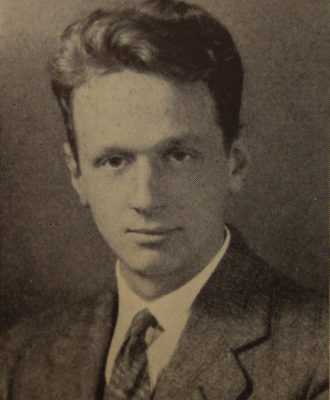SC 1998.56
Ruth T. Watanabe Special Collections
Sibley Music Library
Eastman School of Music
University of Rochester
CONTENTS
DESCRIPTION OF COLLECTION
Location: M2A 8,4
1 foot
Biographical Sketch
Bernhard Theodor Kaun (b. April 5, 1899, in Milwaukee; d. January 3, 1980, in Baden-Baden, Germany) was a film orchestrator, composer, and conductor. He was the fifth child of the German-American composer, conductor, and music teacher Hugo Wilhelm Ludwig Kaun (1862-1932). Hugo Kaun and his bride Clara Friedrich had immigrated to the US in 1887, but, in 1902, the family returned to Germany. Bernhard began musical studies at an early age under his father’s instruction and later studied violin and piano in Berlin. He served in the German army during WWI, playing clarinet in a military band; after the war, he found employment as a music teacher in Germany.
In 1922, Kaun began working as an orchestrator for RCA Victor in Berlin. He moved to New York in 1924, after which he worked as a copyist at a NYC movie theatre and as an arranger for Mills Music Co. That same year, he collaborated with composer Gottfied Huppertz on the music for Fritz Lang’s heroic epic Die Nibelungen: Siegfried (1924). Kaun’s arrangements for the film attracted the attention of Victor Wagner, associate conductor of the Eastman Theatre Orchestra, who then introduced the young composer to Howard Hanson. After working briefly in Milwaukee as an assistant to Heinz Roemheld at the Alhambra Theater (1924), where Roemheld served as music director and orchestra conductor, Kaun moved to Rochester, NY, to work as an assistant to Howard Hanson (1925-1928). At Eastman, he orchestrated Hanson’s Lament of Beowulf, Op. 25 (1925), and Organ Concerto, Op. 27 (1926). He was also involved in organizing the first Festivals of American Music at Eastman and taught theory during the 1926-27 and 1927-28 academic years.
In 1928, Kaun left Eastman and, at the behest of his father, spent some time in Germany. In February 1931, he returned to the US to work as a composer at Universal with Heinz Roemheld, who, by then, was employed as general music director of Universal’s Music Department. For the next decade, Kaun enjoyed a prolific career as a film composer and orchestrator. He contributed to more than 200 films for Universal, Warner Brothers, and Paramount as a composer, orchestrator, arranger, or musical director. His oeuvre of film music includes Heaven on Earth (1931), Universal’s first sound film with a full-length score; Frankenstein (1931); A Farewell to Arms (1932); and Death Takes a Holiday (1934). As an orchestrator, he worked frequently with Max Steiner; among his most well-known contributions are orchestrations for the now classic films King Kong (1933) and Gone with the Wind (1939). Kaun was highly regarded as an orchestrator and worked with several other eminent film composers, including Erich Korngold, Ernst Toch, Dimitri Tiomkin, and Charlie Chaplin.
In 1941, Kaun left Hollywood for New York, where he devoted himself to composing concert music. In 1953, he returned to Germany. Thereafter, he composed music for two German feature films (Special Delivery, 1954; Alle Wege führen heim, 1957) and served as co-conductor of the Graunke Symphony Orchestra in Munich. He died on January 3, 1980, in Baden-Baden, Germany.
.
Provenance
Unknown. The items may have been placed in the library in connection with the American Composers’ Concerts, since two of the items, the Romantic Symphony and the Sinfonia Concertante, were performed on its concerts.
Scope and Content
Works in manuscript and print of Bernhard Kaun along with a recording of his Romantic Symphony.
Associations
Special Collections holds collections of materials relating to twentieth-century composers, particularly those connected with Eastman School or American music.
Restrictions and Use
There are no restrictions on the use of this collection.
DESCRIPTION OF SERIES
The series consists of manuscripts, printed works and one recording of the music of Bernhard Kaun.
INVENTORY
Box 1
| folder 1 | Quintet for Oboe & Strings. Jupiter Music, 1940. Score & Parts |
| folder 2 | Sinfonia Concertante for solo horn and orchestra. Jupiter Music, 1940. Score & reduction for horn & piano. |
| folder 3 | First movement “Basso Ostinato” of unidentified work. Parts |
| folder 4 | Second movement “Im Herbst” of unidentified work. Parts |
| folder 5 | Third movement “Schenke im Fruhling” of unidentified work. Parts |
| folder 6 | Niederlandisches Volkslied. Score |
| folder 7 | Unidentified work (Suite of Sketches?). Parts |
| folder 8 | First Symphony. Parts |
Box 2
| folder 1 | Romantic Symphony. Woodwind part masters |
| folder 2 | Romantic Symphony. Brass & perc. part masters |
| folder 3 | Romantic Symphony. String part masters |
| folder 4 | Romantic Symphony. Set of parts |
| folder 5 | Romantic Symphony. LP recorded by Hamburg Radio Symphony |

